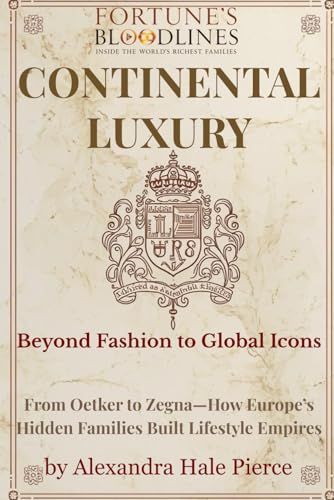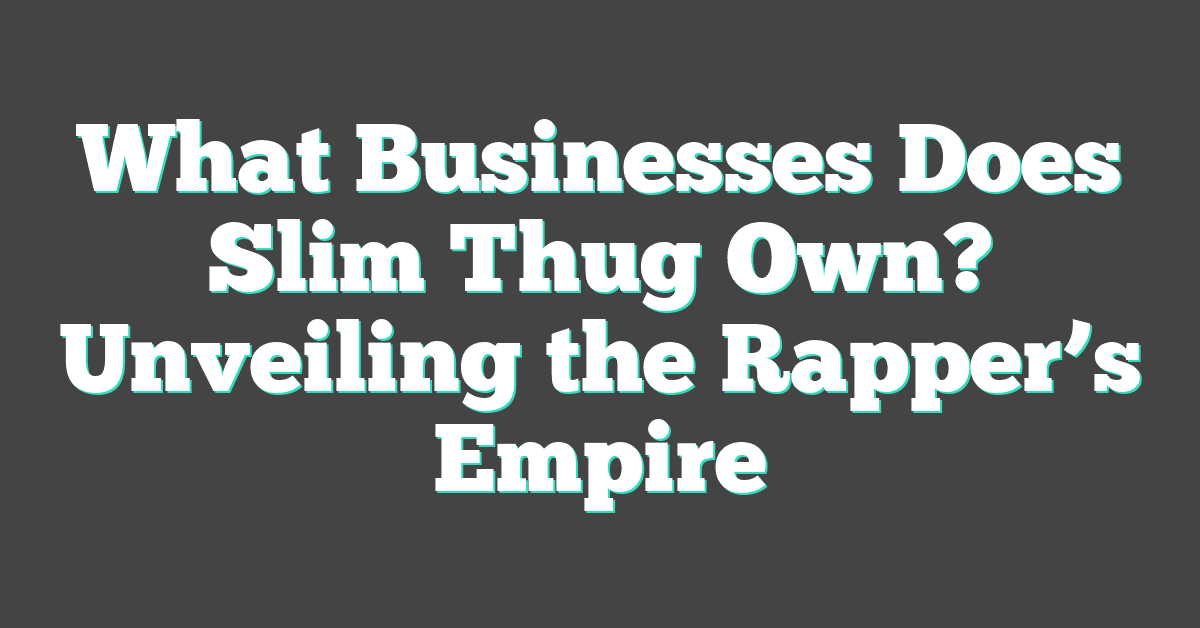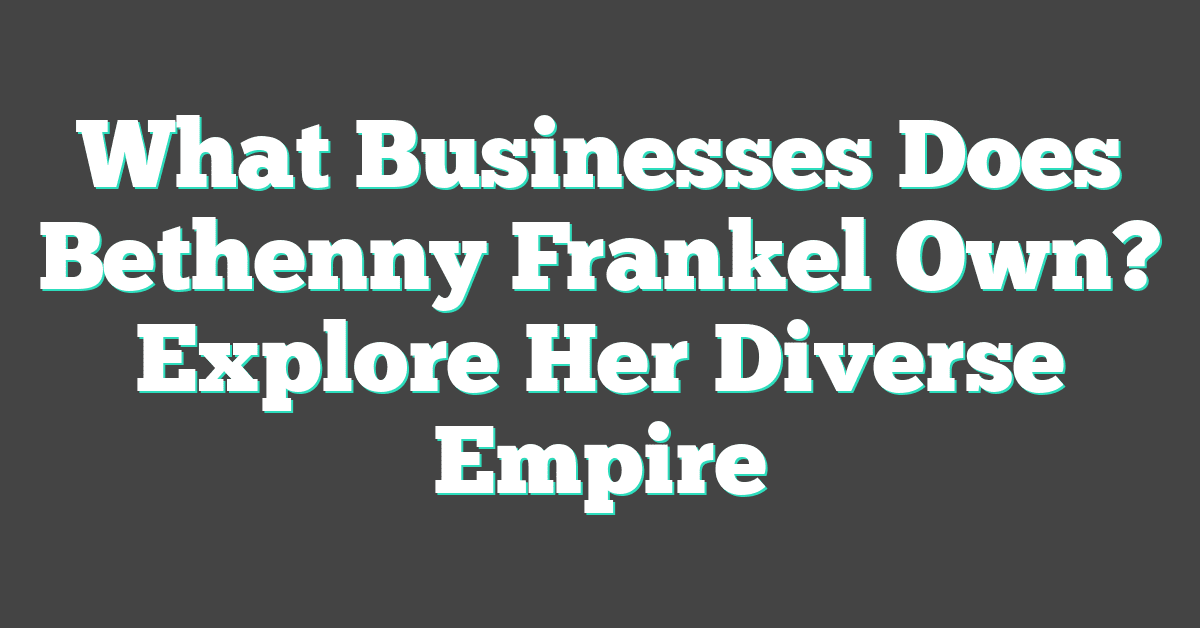Curiosity often piques when it comes to the moguls topping the wealth charts. They’ve not just amassed fortunes; they’ve built empires. From tech giants to luxury fashion icons, these tycoons own businesses that shape our daily lives.

But what’s behind the curtains of their success? It’s not just about the money; it’s about the diverse industries and innovative companies they’ve brought under their wing. Let’s dive into the fascinating world of the top 50 richest business owners and the vast array of enterprises they manage.
Overview of the Top 50 Richest Business Owners
The elite circle of the top 50 richest business owners is a diverse and dynamic group whose wealth spans across various sectors. From technology to retail, and finance to pharmaceuticals, these titans of industry have their hands in just about every pot you can imagine. They’re not just investors but innovators who have redefined the way we live, work, and play.
Many of them started from humble beginnings, with just a bright idea or a small family business. Over the years, they’ve turned their dreams and ventures into multinational entities. They have a knack for spotting opportunities where others see challenges. Additionally, they don’t just maintain their wealth, they grow it. It’s their forward-thinking approaches and risk tolerance that often lead to their mind-boggling success.
Here’s a brief glimpse at the varied realms these moguls dominate:
- Technology giants like Jeff Bezos and Elon Musk have revolutionized e-commerce and the automotive industry, respectively.
- In the finance section, legends such as Warren Buffett have shown what it means to truly understand the ebb and flow of the stock market.
- Retail has its own champions, with the likes of Bernard Arnault, whose luxury goods empire continues to expand globally.
- Telecommunications has seen a surge due to individuals like Carlos Slim.
- The energy sector couldn’t have its prominence without the likes of the Koch brothers who’ve had a longstanding influence.
- In pharmaceuticals, there are visionaries tirelessly working behind the scenes to advance medical science.
Breaking down their holdings, we find an intricate web of subsidiaries and associated companies. These subsidiaries often form a complex map of inter-related businesses that contribute to their parent companies’ overall valuation. Understanding the sheer breadth of these business empires can be daunting, but it also provides a fascinating insight into the upper echelons of corporate strategy and leadership.
It’s this expertise in diversifying their portfolios and making strategic decisions that continue to solidify their positions at the top. As we delve further into their holdings, we realize that for these business magnates, it’s more than just owning companies; it’s about creating a legacy that reshapes the economic landscape.
Tech Giants
In the echelons of wealth, tech titans hold court with portfolios that dazzle both in innovation and in valuation. Silicon Valley and beyond shelter the minds behind the devices, social platforms, and cutting-edge software that revolutionize the way they live and interact.
Amazon’s Jeff Bezos set the pace with an online bookstore that burgeoned into an e-commerce and cloud computing colossus. Embracing a culture of customer obsession and long-term thinking, Bezos’s empire now spans a variety of sectors, including AI and aerospace with Blue Origin.
« What Businesses Does Steve Buscemi Own? Uncover His Wine World Ventures
What Businesses Does Larry Kudlow Own? Uncovering His Diverse Investments »
Meteoric rises are a common theme among these tech magnates. Facebook’s own Mark Zuckerberg redefined social connection and digital advertising, growing a simple college networking site into a global powerhouse with 2.8 billion users. His wealth is tightly tied to the success of a platform that thrives on user engagement and data-driven revenue.
Microsoft’s Bill Gates and Oracle’s Larry Ellison are veterans in this category, having founded their companies in the 70s and 80s. Their legacy is twofold; they’ve advanced the tech industry and used their wealth to champion philanthropic endeavors through the Bill & Melinda Gates Foundation and the Ellison Medical Foundation.
- Notable Tech Industry Leaders:
The surge in technology also propels new players into the fore. Elon Musk, with his ventures Tesla and SpaceX, continually pushes the boundaries of automotive technology and space exploration. His flair for the dramatic and bold bets on the future electrify the public’s imagination and stock markets alike.
In the same vein, Alphabet Inc.—born from Google—shapes the landscape under the stewardship of Larry Page and Sergey Brin. They’ve built an empire on a foundation of search and advertising, expanding into smartphones, cloud services, and exciting forays into autonomous vehicles and AI.
Collectively, they own transformative technologies that not just generate vast wealth but also imprint on the cultural zeitgeist. Their businesses thrive on the cutting edge, forever chasing the next big thing that’ll keep them at the pinnacle of both affluence and influence.
Luxury Brands and Fashion Icons
Amidst the glittering ranks of the wealthiest, a group of individuals stand out for their impact on the luxury fashion world. They’ve stitched their names into the very fabric of society through iconic brands that spell elegance, status, and opulence. The fashion moguls behind these brands have built their empires on the desire for high-end goods and an unparalleled sense of style.
Bernard Arnault, the chairman and CEO of LVMH, towers over this luxe landscape. His vast empire boasts over 70 fashion and cosmetics brands, including Louis Vuitton and Sephora. Under Arnault’s guidance, LVMH has become a standard-bearer in the luxury world, exuding exclusivity and desirability.
Then there’s the Italian fashion titan, Miuccia Prada, co-CEO and lead designer of Prada. Famed for merging understated elegance with intellectual depth, her designs have become a staple for fashion-forward thinkers. Prada has consistently pushed boundaries, blending modernism with classic style to create pieces that resonate with a touch of rebellion.
- François Pinault of Kering Group orchestrates a conglomerate that includes Gucci, Yves Saint Laurent, and Alexander McQueen among others
- These brands are symbols of cutting-edge fashion
- They cater to celebrity wardrobes and set trends worldwide
On the American front, Ralph Lauren has carved out a niche that embodies the essence of classic Americana with his eponymous brand. Lauren’s designs reflect a story of timeless luxury, often associated with the elite sport of polo, that has shaped the casualwear industry.
Amancio Ortega, the founder of Inditex, which owns Zara, stands out for revolutionizing the fast-fashion industry. His ability to quickly bring high-fashion designs to retail racks at an affordable price points has changed the way people shop across the globe. Zara’s success shows that luxury doesn’t always have to come with a hefty price tag.
These titans of the fashion world not only dress the who’s who but also wield tremendous influence over global fashion trends and consumer choices. They’ve tailored their brands to not just participate in the market but to set the pace and the expectations for what luxury means.
Real Estate Titans
Amid the sea of wealth that the top 50 richest business owners have amassed, real estate stands as a pillar of prosperity. These magnates of the property market have not just built structures; they’ve shaped skylines. Donald Bren sits at the pinnacle of this empire, the prime mover behind the Irvine Company, which holds an incredibly diversified portfolio across Southern California including office buildings, apartments, and marinas.
Moving eastward, one can’t overlook the painstakingly detailed developments of Stephen Ross, who helms Related Companies. Ross’ feat with the luxurious Hudson Yards in Manhattan has set a new standard for mixed-use spaces, blending high-end residential units with commerce and culture. It’s a masterwork in property that few others could dream of realizing.
In the realm of hotels and hospitality, few have done it with as much flair as Sheldon Adelson. Through Las Vegas Sands Corp, he’s turned once-barren lands into bustling centers of leisure and entertainment. His Venetian and Palazzo hotels aren’t just buildings; they’re destinations.
Mall magnate David Simon takes a slightly different approach to real estate, focusing on retail mega-centers. His Simon Property Group is the largest REIT in America, owning and managing a cornucopia of shopping destinations. Simon’s expertise has guided the company through an ever-evolving retail landscape, ensuring that physical shopping retains its allure in the digital age.
Crossing continents, one encounters a powerhouse in the name of Lee Shau Kee, with Henderson Land Development. This tycoon’s touch extends beyond Hong Kong, seeding developments that have both fueled and been fueled by the region’s dynamic growth.
- Irvine Company: Diverse portfolio in California
- Related Companies: Luxurious Hudson Yards in Manhattan
- Las Vegas Sands Corp: Transformative hospitality enterprises
- Simon Property Group: America’s leading retail REIT
- Henderson Land Development: Pioneering developments in and beyond Hong Kong
These real estate titans aren’t just constructing buildings; they’re cultivating communities. Their visions extend beyond the mere act of building; they foster environments that encapsulate the essence of luxury, convenience, and innovation.
Entertainment and Media Moguls
The business magnates that dominate the entertainment and media landscape have a flair for captivating audiences worldwide. They wield substantial influence and own networks, studios, and various platforms that not only entertain but also inform and shape public opinion.
Rupert Murdoch stands at the forefront of this group, controlling a media empire that includes Fox News, The Times of London, and The Wall Street Journal. With his grasp over news outlets, Murdoch has the power to influence how stories are told and which topics capture the public’s attention.
Another titan of industry is Bob Iger, who rejuvenated The Walt Disney Company during his tenure as CEO. Under his leadership, Disney expanded its portfolio to include Pixar, Marvel, and Lucasfilm. Each acquisition brought beloved characters and stories into the Disney fold, securing the company’s place at the pinnacle of family entertainment.
The streaming revolution has its own set of champions, such as Reed Hastings of Netflix. With a vision for a new way to consume media, Hastings transformed the business model for television and film, pioneering the charge for streaming services. Netflix’s success has forced the entire industry to pivot towards a digital future.
Jeff Bezos expanded his reach beyond eCommerce with the acquisition of The Washington Post and the creation of Amazon Studios. Bezos’s ventures into media showcase how the lines between technology and entertainment are increasingly blurring with the rise of original content accessible through a plethora of devices.
These moguls’ interests in the sector are as diverse as the content their companies produce:
- News and Publishing
- Cinema and Production Studios
- Streaming Services and Digital Content
- Broadcast and Cable Television
The contributions of these visionaries have redefined the parameters of storytelling and access to information. Their constant innovation keeps them at the cutting edge of the industry, ensuring there’s always something new to captivate audiences around the globe.
Automotive Industry Tycoons
Delving into the realm of high-octane innovation and luxury, the automotive industry boasts some of the most prominent names in the top 50 richest business owners. These tycoons are not just ahead in horsepower but also in towering net worth and influence.
Elon Musk, CEO of Tesla, Inc., stands out as an emblematic figure who has revolutionized the automotive industry with electric vehicles and sustainable energy solutions. Its car models have become synonymous with innovation and eco-friendliness, propelling Musk to the forefront of automotive royalty.
Another giant in the arena is Li Shufu, the chairman of Geely Automobile Holdings, the company behind Volvo and the London Taxi Company. Geely’s acquisition of these brands exhibits a strategic move towards a global footprint in the automotive market.
Stuttgart’s crown jewel, Porsche AG, adds to the list with the Piech family, descendants of Ferdinand Porsche, holding a significant stake in Volkswagen AG, the parent company. The Porsche name has long been associated with luxury, performance, and precision engineering.
| Global Rank | Name | Associated Company |
|---|---|---|
| 2 | Elon Musk | Tesla, Inc. |
| 18 | Li Shufu | Geely |
| 32 | Piech family | Porsche AG |
Susanne Klatten and Stefan Quandt, heirs to a significant portion of BMW, steer their legacy with a keen eye on future mobility and technological advancements. They maintain the brand’s allure while navigating the shift towards autonomous and electric vehicles.
The automotive landscape these tycoons traverse is marked by a relentless pursuit of excellence and a drive to innovate. Combining horsepower with high finance, they ensure the wheels of their empires keep turning at a breakneck pace, always racing towards the next big breakthrough in the auto world.
Conclusion
The journeys of the top 50 richest business owners illuminate a landscape of ambition and innovation across various industries. They’ve built empires that not only stand tall in real estate and stretch wide across the entertainment and media horizon but also race forward in the automotive sector. Their contributions have undeniably transformed how we live, work, and play. With every skyline reshaped, story retold, and vehicle reimagined, these titans of industry continue to push the boundaries of what’s possible, leaving an indelible mark on the world. Their legacies are built on a foundation of risk, creativity, and an unyielding drive to redefine the future.
Frequently Asked Questions
Who are the top real estate moguls mentioned in the article?
Donald Bren, Stephen Ross, Sheldon Adelson, David Simon, and Lee Shau Kee are highlighted as the real estate titans who have made significant contributions to the industry by shaping landscapes and building luxury, convenience, and innovation into their developments.
What major contributions have entertainment and media moguls made?
Rupert Murdoch, Bob Iger, Reed Hastings, and Jeff Bezos are noted for controlling significant media empires, rejuvenating iconic companies, reshaping content delivery through streaming services and innovating within the industry to enhance global access to entertainment and information.
How have the individuals in the automotive industry made their mark?
Elon Musk, Li Shufu, and the Piech family have revolutionized the automotive industry by developing electric vehicles, broadening global influence through acquisitions, and emphasizing technological advancements in future mobility. They blend innovation with high finance in the relentless pursuit of progress in the automotive world.
















